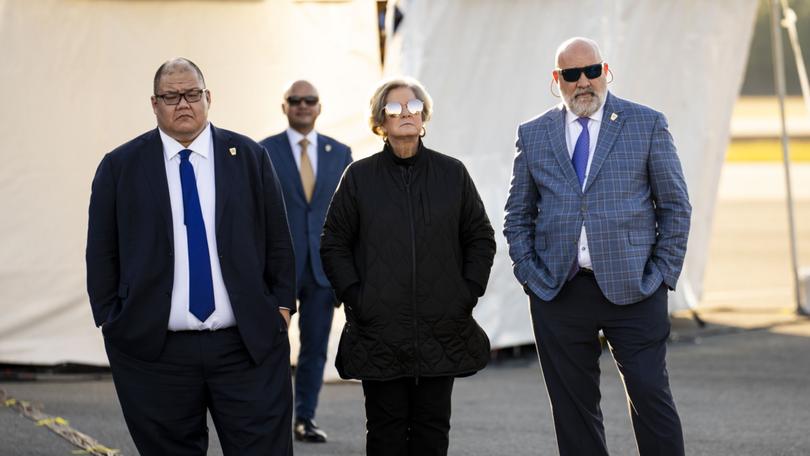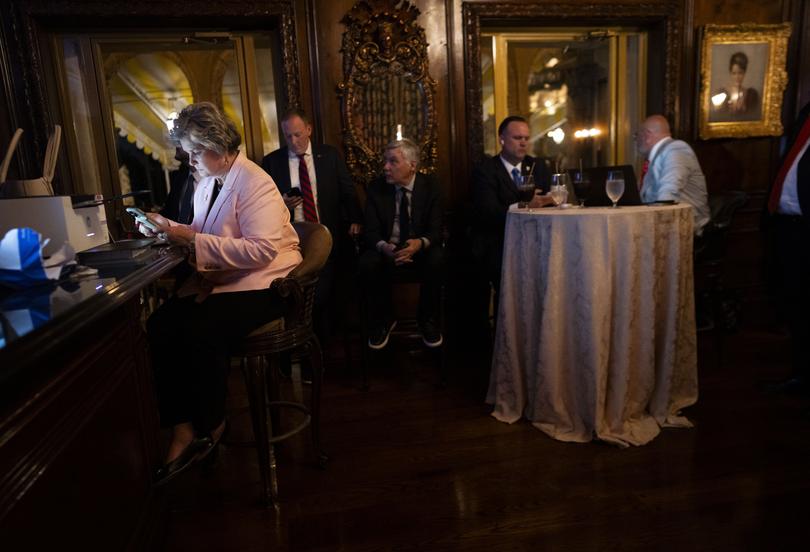Inside the lobbying career of Donald Trump’s new chief of staff Susie Wiles
Donald Trump’s second presidential transition is moving quickly, in part because of the leadership of a veteran operative who until earlier this year represented interests of the sort he once pledged to curb.

Donald Trump’s first presidential transition was marked by chaos and vows to drain the swamp.
His second transition is moving more quickly, in part because of the leadership of a veteran operative who until earlier this year represented special interests of the sort he had once pledged to curb.
The appointment of that operative, Susie Wiles, to be Trump’s chief of staff in the White House signals that his second term, like his first, may not be as hostile to special interests as his campaign rhetoric suggested. It also underscores the utility of having advisers who understand the intersection of politics, business and government.
Sign up to The Nightly's newsletters.
Get the first look at the digital newspaper, curated daily stories and breaking headlines delivered to your inbox.
By continuing you agree to our Terms and Privacy Policy.A long-time strategist and lobbyist for business interests and political campaigns, Wiles ran Trump’s campaign, and her trusted role in the new administration is already evident. She has been deeply involved in assembling Trump’s new executive office. Last week, she addressed an influential group of donors in Las Vegas, saying, among other things, that Trump planned to reinstate some of his prior executive orders that President Joe Biden had revoked.
Wiles, 67, was registered as a lobbyist until early this year. She did not sever ties with Mercury Public Affairs, where she began working in 2022, until after she was named chief of staff Nov. 7, said two people familiar with the timing who spoke on the condition of anonymity to discuss private matters.
Her appointment continues a tradition of onetime lobbyists being tapped for high-level government posts by presidents from both parties. They include Ron Klain, who was Biden’s first chief of staff, though his last disclosed lobbying activity was more than 15 years before he took the White House role.
This so-called revolving door has drawn criticism from government ethics groups.
One consumer advocacy group, Public Citizen, has warned about Wiles’ lobbying background and demanded that she recuse herself from policy matters that might affect her former clients.
“By putting a corporate lobbyist in charge of his administration with his first act as president-elect, Trump is hanging a ‘for sale’ sign on the front door of the White House,” Jon Golinger, who investigates corporate influence on elections and government at the organization, said in a statement.
Other ethics experts are more willing to withhold judgment. They stress the importance of Wiles’ adherence to ethics guidelines — under which most presidential administrations require that employees recuse themselves from matters related to their past employment for at least the previous year. Trump’s team has indicated that it plans to release such guidelines.
John Delaney, the former mayor of Jacksonville, Florida, who hired Wiles three decades ago as his communications director and later appointed her as his chief of staff, said he did not think of her as a “backslapping, fundraising, delivering-envelopes-of-campaign-checks kind of lobbyist.” Trump calls her the “ice maiden,” an affectionate nod to her reserved nature.

Brian Hughes, a spokesperson for the transition, said in a statement that Wiles “has an undeniable reputation of the highest integrity and steadfast commitment to service both inside and outside government” and “will bring this same integrity and commitment as she serves President Trump in the White House.”
During his recent campaign, Trump continued to voice scepticism about lobbyists.
“You have to stop listening to lobbyists,” Trump said in an interview with podcaster Theo Von in August. “You know, I was not a big person for lobbyists, and if they have even a little access to a president or a senator or a congressman or woman,” he added, “they get a lot of money, and in some cases they just take the money; they don’t do anything.”
Yet Trump’s nominee to lead the Transportation Department in his second term, Sean Duffy, was a registered lobbyist for a coalition of airlines in 2020 and for a group of investors holding Venezuelan government debt as recently as last year.
On Thursday, Trump tapped Pam Bondi as his pick for attorney general. Bondi is a former Florida attorney general and lobbyist with Ballard Partners, a lobbying firm run by prominent Florida Republican fundraiser Brian Ballard.
And during his campaign, lobbyists were among Trump’s top fundraisers and advisers. Demand for their services jumped after the election, as corporate and foreign interests jockeyed to curry favour with the new administration.
Wiles, daughter of sportscaster and onetime NFL kicker Pat Summerall, spent most of her political career working on Republican campaigns or in local and federal government offices. In recent decades, she has run campaigns for Sen. Rick Scott and Gov. Ron DeSantis of Florida, with whom she fell out before he challenged Trump in this year’s primaries.
In 2011, Wiles joined Ballard Partners. After Trump’s victory in 2016 — a campaign that Wiles ran in Florida and for which Ballard was a top financial backer — she helped Ballard Partners open an office in Washington, where there was in high demand for the firm’s services because of its ties to Trump.

She was registered to lobby for about 40 clients during her years at Ballard Partners, ranging from the city of Jacksonville to major companies and foreign interests, including a Nigerian political party and a media company owned by a Venezuelan billionaire who would later be indicted on charges related to money laundering.
Ballard said that Wiles did no work for the Nigerian party or the media company, and that most of her work for other clients focused on strategy and messaging, rather than lobbying.
He said the firm registered her as a lobbyist for many clients “out of an abundance of caution,” at a time when it was just beginning its federal lobbying.
“We were new to town, and we basically registered in many cases everybody in the firm for all clients,” he said. “If she was ever in a meeting with a senator or a congressman where an issue came up, we wanted to make sure that she was covered.”
She helped the Suzanne Wright Foundation try to persuade the government to prioritize researching pancreatic cancer. She coached the Motion Picture Association to emphasize its industry’s ability to create well-paying domestic jobs in seeking beneficial tax measures and copyright protections from the Trump administration, which it won, according to the association’s executive vice president for government affairs, Patrick Kilcur.
Wiles also helped land another Ballard Partners lobbying client, the Pebble Partnership, Ballard said. The Pebble Partnership had been tussling with environmental regulators for more than a decade when it hired Ballard’s firm in 2019 to help it secure regulatory permits for an open-pit copper and gold ore mine in southwestern Alaska that was opposed by environmental and Native groups as a threat to salmon breeding grounds in the nearby Bristol Bay.
Trump had initially signalled support for the Pebble Partnership’s planned mine. But in 2020, Trump’s eldest son, Donald Trump Jr., went public with his opposition, and the Army Corps of Engineers ultimately denied the permit.
The client with which Wiles is most closely associated, tobacco company Swisher International, is based in Jacksonville, near her home. She worked for the company when it was a client of Ballard Partners, then took the account with her to Mercury, where it was the only client she registered to lobby for, according to federal filings. Her work for Swisher, said people familiar with it, focused mainly on advising on regulatory policy issues.
Swisher has in recent years been battling the Food and Drug Administration over whether flavoured cigars should be banned in an effort to curb consumption of tobacco by minors and young adults. Trump was opposed to flavoured tobacco in the past but recently vowed on social media to “save Vaping again!”
Wiles helped Swisher by organizing interest groups and others to oppose a potential ban, according to someone familiar with the matter. She has denied influencing the president-elect on the topic.
This article originally appeared in The New York Times.
© 2024 The New York Times Company
Originally published on The New York Times
